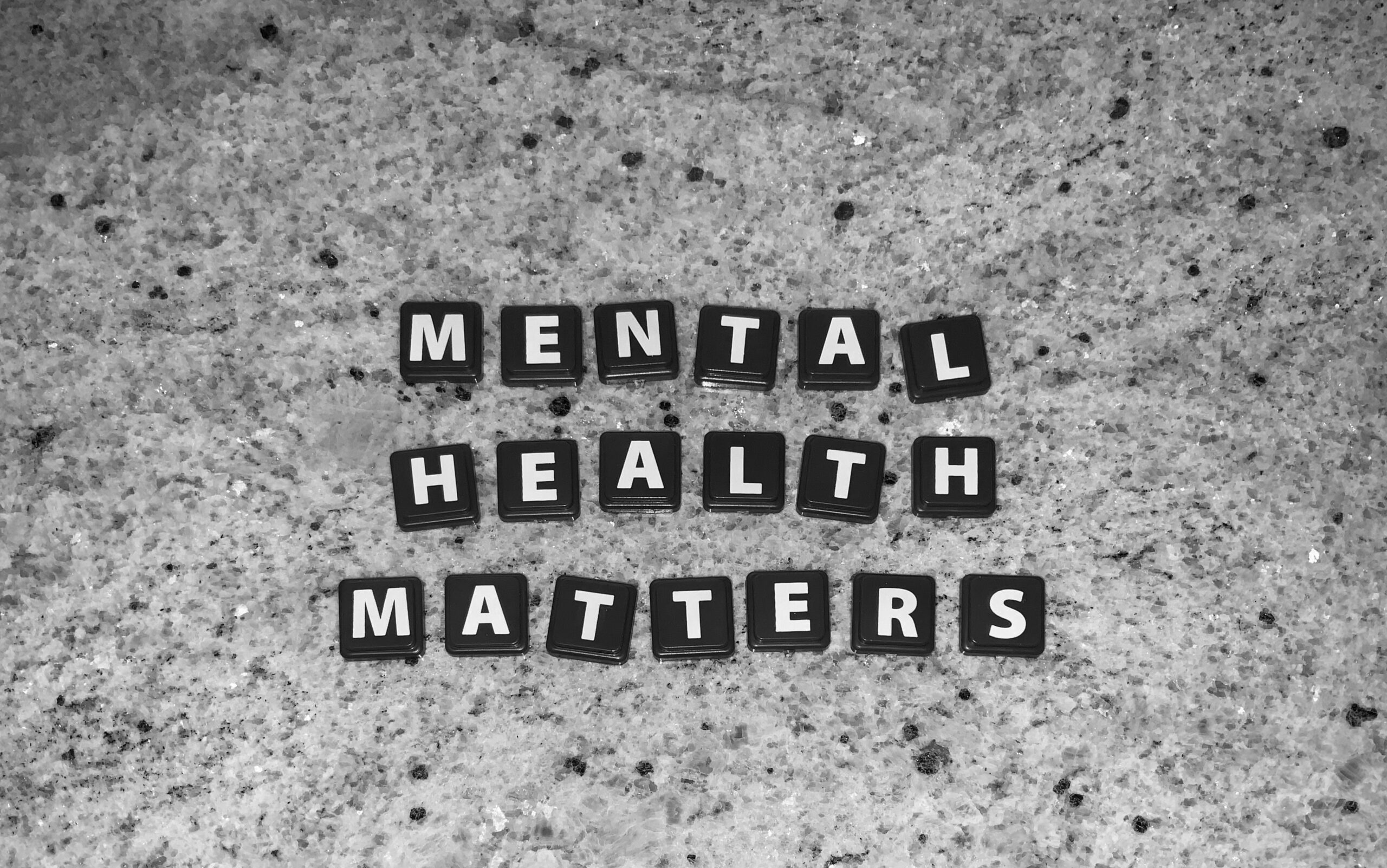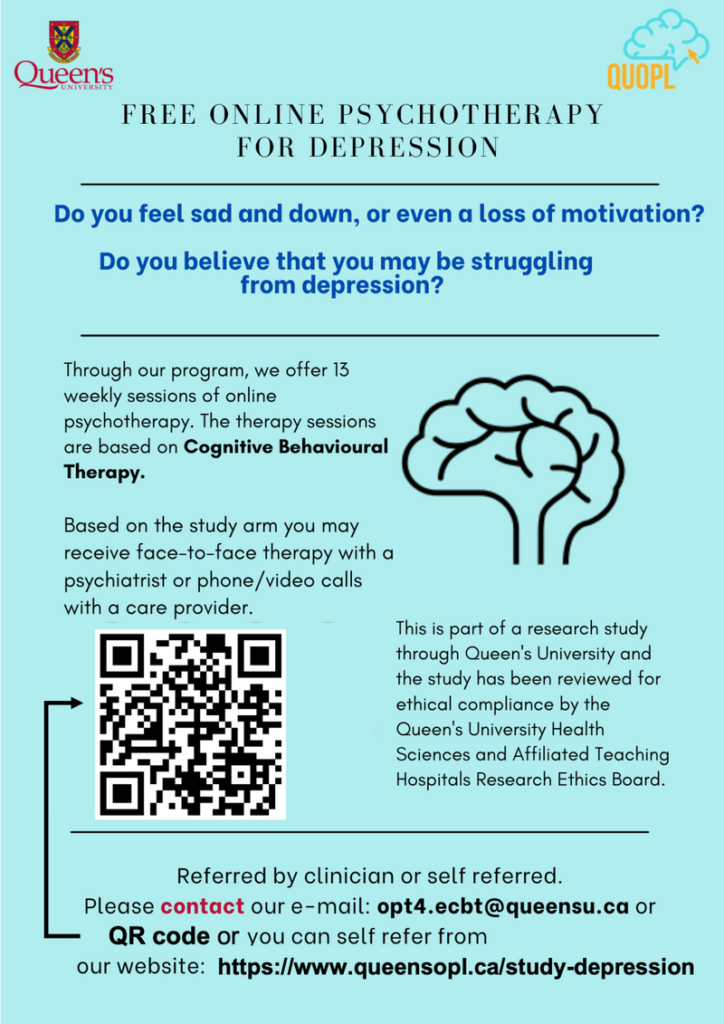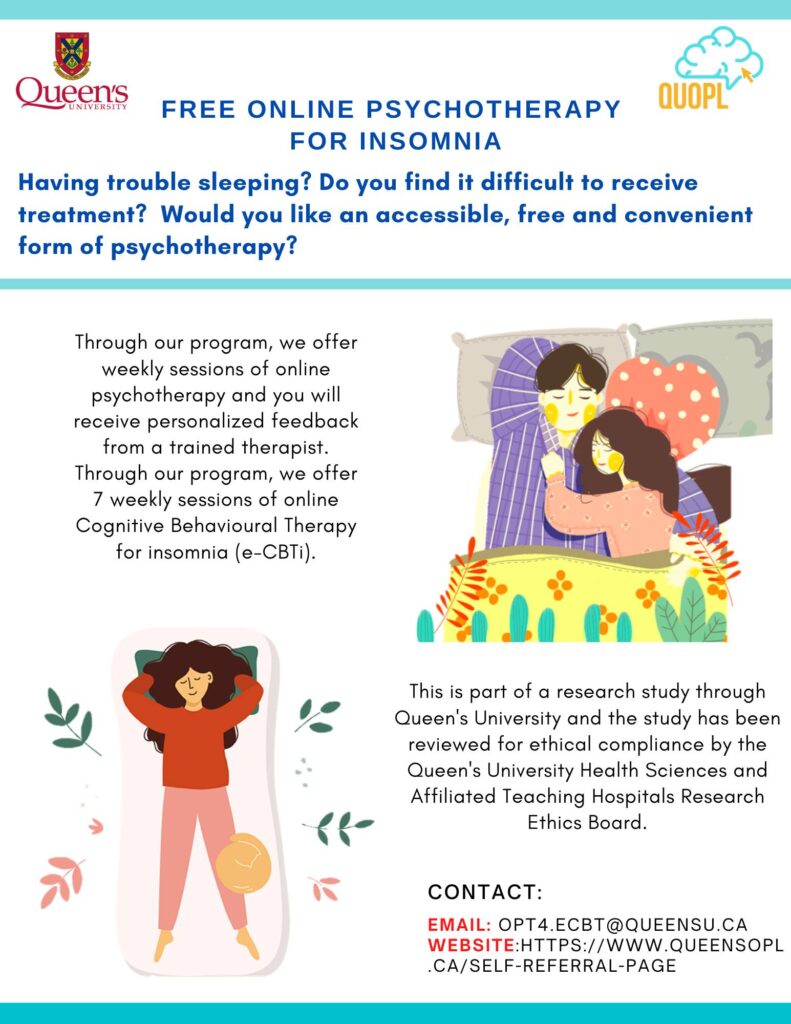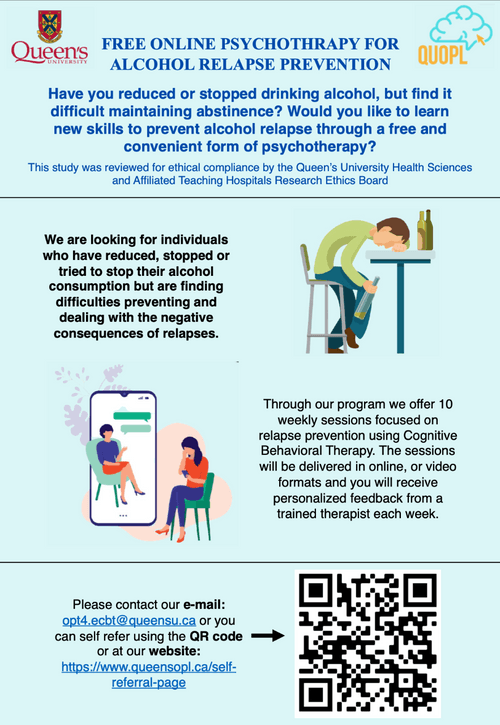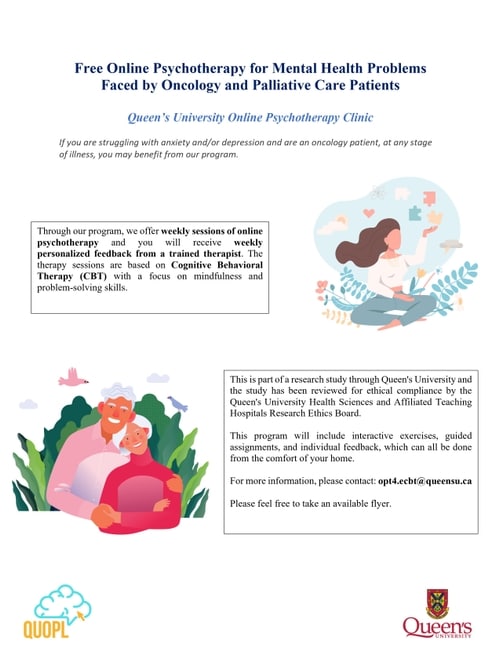Queen’s University is offering free virtual cognitive behavioural therapy (CBT) to eligible Ontarians who are experiencing symptoms of depression, insomnia, disordered use of alcohol, or who are correctional workers with symptoms of PTSD, depression, or anxiety, as well as for patients being treated for cancer with symptoms of anxiety or depression.
Many of us have seen a decline in mental health amongst our loved ones since the pandemic, and reports from Statistics Canada, the Centre for Addiction and Mental Health, and the Angus Reid Institute bear that out. Mental health support services in our province can be difficult to access — or simply unaffordable. In response, the Queen’s University Online Psychotherapy Lab (QUOPL) is working to address the need for mental health care with its free programs for specific groups of people, and they are looking to recruit as many participants as possible over the next two years.
Courses of virtually-delivered CBT range from 7 weeks to 13 weeks, depending on the study, and participants must be currently in Ontario. Because these services are being offered as part of clinical trials, there are specific eligibility criteria for each, with interviews for those interested to determine their eligibility.
Recruitment is occurring for QUOPL’s Depression AI Study (for people 18 years and older experiencing symptoms of depression); the Insomnia Study (for those 18 years or older experiencing insomnia); the Alcohol Use Disorder Study (anyone aged 18 to 65 who is trying to stop consuming alcohol but fighting against relapses); the Correctional Workers Study (for any current correctional workers with symptoms of PTSD, depression and/or anxiety); the Cancer/Palliative Care Study (for any current oncology patient, regardless of stage of illness, experiencing anxiety and/or depression).
The psychotherapy programs are individual CBT, and, according to QUOPL’s Dr. Gilmar Gutierrez, “are delivered through the online psychotherapy tool, a secure, cloud-based digital mental health platform, under the supervision of a therapist.” The therapy platform is compliant with all relevant Canadian health information and privacy regulations. Weekly sessions include CBT content, helpful coping skills, and an assignment, which is reviewed by the therapist upon submission. The therapist then gives “personalized feedback to guide the participants through the therapy program.”
Because these are clinical trials, the data collected from the studies, including psychiatric scales, therapy worksheets, and user metrics, will be analyzed to determine the effectiveness of online psychotherapy programs compared to other typical treatments, and, ultimately, published in academic journals. As is standard in academic studies involving living humans, all data are anonymized: that means that there will be no personal information or anything that could identify an individual person in the data that are collected, analyzed, and published. Anyone who participates in these programs will be asked to sign a consent form prior to beginning the program, which also outlines all the research components in the study.
We asked Dr. Gutierrez about why QUOPL is doing this work:
“Our digital care initiative aims to tackle the important issue of unmet mental healthcare needs across the province. In Canada, approximately 2.3 million people report unmet or partially unmet mental healthcare needs, resulting in an annual mental healthcare burden of nearly $50 billion. This is a complex situation which has contributed to higher Emergency Departments (EDs) utilization, healthcare costs, length of hospital stays and the likelihood of readmission and worse clinical outcomes. Therefore, to help address this critical healthcare gap, our lab, the Queen’s University Psychotherapy Lab (QUOPL), led by Dr. Nazanin Alavi, has produced and validated several diagnosis-specific online psychotherapy programs based on cognitive behavioral therapy (CBT), the gold-standard psychotherapeutic option for a variety of psychiatric conditions. Online CBT (e-CBT) has become a promising therapy solution in recent years and has demonstrated similar effectiveness in the management of psychiatric symptoms as standard in-person CBT. In-person CBT, like many other in-person mental health services, has many barriers including poor availability, high resource utilization, geographical limitations (mainly accessible if you live in bigger city centres), and time availability limitations (therapy sessions mainly available during work hours, so workers need to take time off work to attend therapy sessions). Comparatively, e-CBT takes advantage of the flexibility, accessibility, cost effectiveness and efficiency of online platforms to increase the healthcare capacity of the system and overcome these barriers.
Dr. Nazanin Alavi is the Psychiatrist-in-Chief and Chair of the Division of Adult Psychiatry in the Department of Psychiatry at Queen’s University. She began her mission of making mental healthcare more affordable and accessible in 2007, through her work with new immigrants to Canada. This patient population often faces a higher risk of developing mental health conditions, and very limited and sometimes inaccessible mental healthcare options. Following this passion, she has become a pioneer in online healthcare and online psychotherapy in Canada, with nearly two decades of experience in the field. She also has expertise in education, women’s health and training and providing technical and academic support to clinicians wanting to implement online psychotherapy. In 2019, she was recognized as one of Canada’s Top 10 Women Leaders in Digital Health. She has also presented her research in digital mental health in several conferences, including the 2022 APA Meeting in San Francisco where she won the World Economic Forum Youth Mental Health Challenge alongside her team.”
If you are interested in participating in any of the QUOPL programs, go to their website, queensopl.ca, click through to the study you’d like to participate in, and click on “Referral” to fill out the self-referral form. You can also find the self-referral form on QUOPL’s Contact page (click here), or email them at opt4.ecbt@queensu.ca
Sources:
Angus Reid Institute. 2022. Two years of COVID-19: Half of Canadians say their mental health was worsened; women under 55 hit hardest. Url: https://angusreid.org/covid-19-pandemic-anniversary-mental-health/ (accessed Sept. 29, 2023).
Centre for Addiction and Mental Health. n.d. The crisis is real. Url: https://www.camh.ca/en/driving-change/the-crisis-is-real (accessed Sept. 29, 2023).
Statistics Canada. 2022. Self-rated mental health decreases after another year of the COVID-19 pandemic. Url: https://www150.statcan.gc.ca/n1/daily-quotidien/220607/dq220607e-eng.htm (accessed Sept. 29, 2023).

